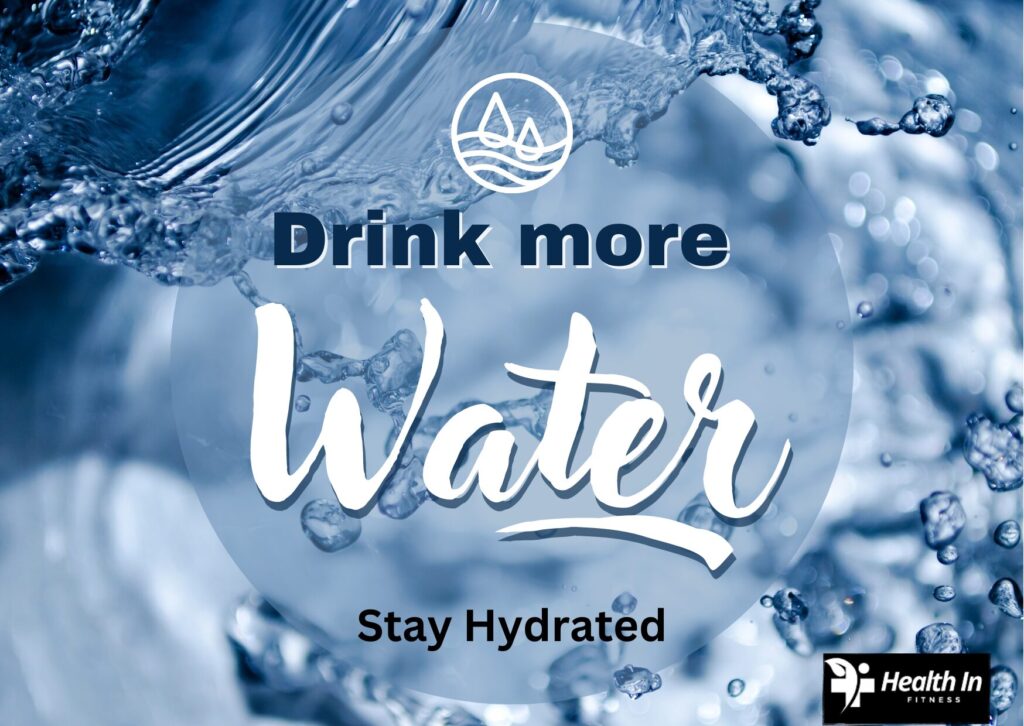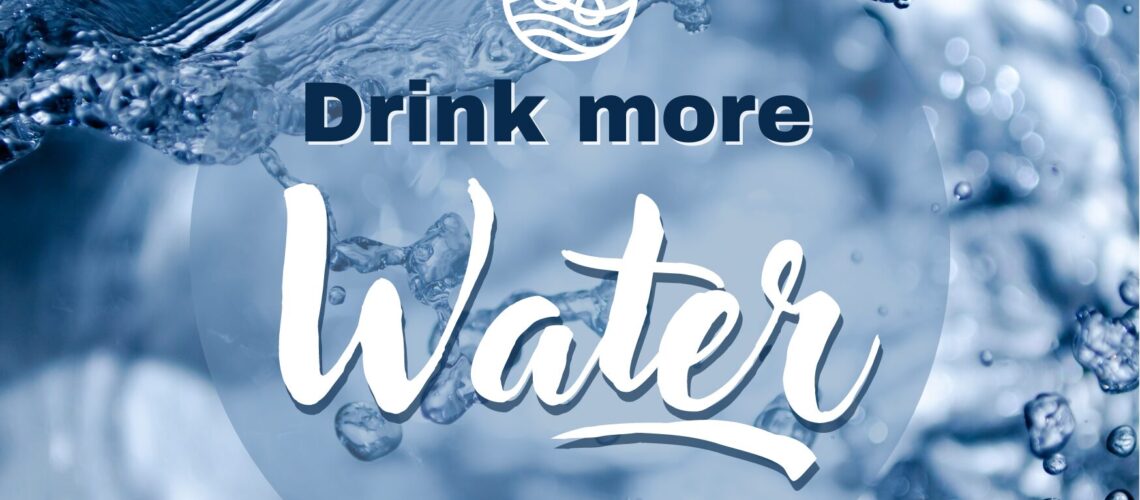
Staying hydrated is one of the most fundamental aspects of maintaining overall health and wellness. Water, a primary component of the human body, plays a crucial role in regulating various bodily functions, including digestion, nutrient absorption, temperature regulation, and even cognitive function. When it comes to fitness, hydration in overall wellness and fitness becomes even more critical, as physical activity accelerates water loss through sweat, making it essential to replenish fluids to maintain performance and avoid dehydration.
In this guide, we will delve deeply into the role of hydration in supporting your overall wellness and fitness journey, exploring the physiological importance of water, how to maintain proper hydration levels, the signs of dehydration, and much more.
1. The Importance of Hydration in Overall Wellness: The Role of Hydration in Overall Wellness and Fitness
Hydration is critical to the proper functioning of nearly every system in your body. Water accounts for about 60% of your body weight and supports several essential processes. Understanding why staying hydrated is so vital can encourage better hydration habits and lead to improved wellness and fitness outcomes.
A. Water and Its Function in the Human Body
Water is involved in many bodily functions, including:
- Cellular Function: Water is essential for transporting nutrients to your cells and removing waste products. Every cell, tissue, and organ in the body requires water to function properly.
- Temperature Regulation: Through sweat, your body releases water to help cool down and regulate body temperature during physical activity or exposure to heat.
- Joint Lubrication: Water acts as a lubricant for joints and helps maintain the synovial fluid that cushions your joints during movement, which is particularly important during exercise.
- Digestive Health: Water aids in digestion by breaking down food and helping absorb nutrients. It also prevents constipation by softening stool.
- Kidney Function: Your kidneys filter waste from the blood, and they require water to function efficiently. Proper hydration helps prevent kidney stones and supports urinary health.
- Detoxification: Water helps remove toxins and waste products from the body through urine, sweat, and bowel movements.
B. Hydration and Cognitive Function
Maintaining proper hydration levels has a direct impact on brain function. Even mild dehydration can impair mood, concentration, and memory, while prolonged dehydration can lead to more severe cognitive issues. The Role of Hydration in Overall Wellness and Fitness is vital for maintaining brain structure and function, as it supports the transmission of electrical signals between neurons.
Studies show that staying hydrated can help improve focus, reduce mental fatigue, and enhance productivity. On the other hand, dehydration can lead to headaches, dizziness, and difficulty concentrating.
2. Hydration and Physical Performance
Hydration is essential for athletes and fitness enthusiasts alike. Proper hydration before, during, and after exercise can significantly affect your performance, endurance, and recovery. Understanding how water supports physical activity is key to optimizing your fitness routine.
A. Water and Exercise Performance
During exercise, your body loses water through sweat to help cool down and regulate body temperature. This fluid loss can lead to dehydration if not replenished. Even a small decrease in hydration levels—about 2% of your body weight—can negatively affect your physical performance.
- Endurance: Dehydration can decrease your endurance, making it harder to sustain physical activity for extended periods. Muscles rely on water to transport oxygen and nutrients, and when hydration is compromised, so is performance.
- Strength and Power: Without adequate hydration, your muscles may experience cramps, weakness, and fatigue, reducing your overall strength and power output.
- Recovery: After a workout, your body needs water to repair and build muscle tissue. Staying hydrated supports recovery by flushing out toxins, delivering nutrients to muscles, and reducing inflammation.
B. The Impact of Dehydration on Fitness
Dehydration can significantly impair exercise performance and increase the risk of heat-related illnesses. Symptoms of dehydration during exercise include:
- Increased heart rate
- Reduced endurance
- Muscle cramps and weakness
- Dizziness or lightheadedness
- Fatigue
- Nausea
In extreme cases, dehydration can lead to heat exhaustion or heatstroke, both of which are medical emergencies.
3. The Role of Electrolytes in Hydration
While water is essential for hydration, electrolytes—minerals like sodium, potassium, calcium, and magnesium—play an equally important role. Electrolytes help regulate fluid balance in the body, support nerve function, and facilitate muscle contractions.
A. What Are Electrolytes?
Electrolytes are electrically charged minerals that help maintain proper fluid balance and support muscle function. They are lost through sweat during exercise and need to be replenished to maintain optimal performance and hydration levels.
Key electrolytes include:
- Sodium: Helps maintain fluid balance and is essential for muscle contractions.
- Potassium: Supports nerve and muscle function, helping to prevent muscle cramps.
- Magnesium: Aids in muscle function and relaxation, playing a key role in preventing cramps.
- Calcium: Essential for muscle contraction and proper nerve function.
B. How to Replenish Electrolytes
To maintain hydration during and after exercise, it’s important to replenish both water and electrolytes. Sports drinks, coconut water, and electrolyte powders are common sources of electrolytes, but you can also get them from whole foods like:
- Bananas (rich in potassium)
- Leafy greens (high in magnesium)
- Dairy products (good source of calcium)
- Salty snacks like pretzels (contain sodium)
4. Hydration Tips for Active Individuals
Maintaining hydration levels during exercise is crucial for optimizing performance and preventing dehydration. Here are some practical hydration tips for fitness enthusiasts and athletes:
A. Hydration Before Exercise
It’s essential to start your workout well-hydrated. Drink plenty of water in the hours leading up to your workout, especially if you plan on engaging in intense or prolonged physical activity.
- Drink 16-20 ounces of water two to three hours before exercise: This ensures that your body is adequately hydrated by the time you start working out.
- Drink 8-10 ounces 20-30 minutes before exercise: This provides an extra hydration boost just before you begin your workout.
B. Hydration During Exercise
During exercise, it’s important to maintain hydration levels, especially if you’re working out in a hot or humid environment. Drinking water regularly can help prevent dehydration and maintain performance.
- Drink 7-10 ounces of water every 10-20 minutes during exercise: This helps replace fluids lost through sweat and keeps you hydrated.
- Use sports drinks for intense or prolonged workouts: For exercise lasting longer than an hour, consider drinking a sports drink that contains electrolytes to replenish sodium, potassium, and other minerals lost through sweat.
C. Hydration After Exercise
Rehydration is just as important as pre- and intra-workout hydration. Drinking water after exercise helps replenish fluids lost through sweat and aids in recovery.
- Drink 16-24 ounces of water for every pound of body weight lost during exercise: Weigh yourself before and after a workout to determine how much fluid you’ve lost and need to replenish.
- Incorporate electrolytes if necessary: If you’ve been sweating heavily, replenish lost electrolytes with a sports drink, coconut water, or an electrolyte-rich snack.
5. Signs and Symptoms of Dehydration
Recognizing the signs and symptoms of dehydration is critical for preventing serious health issues, especially during physical activity. Dehydration occurs when your body loses more fluid than it takes in, and even mild dehydration can cause discomfort and impair performance.
A. Early Signs of Dehydration
Early signs of dehydration can be subtle but should be addressed before they worsen:
- Thirst
- Dry mouth or lips
- Dark-colored urine
- Fatigue or tiredness
- Headaches
- Dizziness or lightheadedness
B. Severe Symptoms of Dehydration: The Role of Hydration in Overall Wellness and Fitness
If dehydration is not addressed promptly, it can lead to more severe symptoms, including:
- Rapid heartbeat
- Rapid breathing
- Confusion or irritability
- Fainting
- Inability to sweat
- Heat exhaustion or heatstroke
Severe dehydration is a medical emergency and requires immediate treatment. Rehydration should begin as soon as early symptoms of dehydration appear.
6. Hydration for Specific Populations
Different groups of people may have unique hydration needs depending on factors such as age, health status, and fitness level. Let’s explore the hydration needs of specific populations.
A. Hydration for Children and Teens
Children and teens are at higher risk of dehydration due to their higher activity levels and smaller body sizes. It’s important to encourage children to drink water regularly, especially during physical activity.
- Offer water throughout the day: Ensure that children have access to water at school, during sports, and at home.
- Encourage water over sugary drinks: Sugary drinks can lead to dehydration, so it’s important to teach children to choose water or natural fruit juices instead.
B. Hydration for Seniors
As we age, the body’s ability to conserve water decreases, and the sensation of thirst may diminish. This makes older adults more prone to dehydration. Staying hydrated is crucial for seniors to maintain cognitive function, prevent constipation, and support heart health.
- Encourage regular water intake: Seniors should aim to drink water consistently throughout the day, even if they don’t feel thirsty.
- Monitor hydration during illness: Illnesses like colds or flu can increase the risk of dehydration in older adults. Encourage fluid intake, especially during recovery.
C. Hydration for Pregnant and Breastfeeding Women
Hydration is particularly important for pregnant and breastfeeding women, as fluid needs increase to support the growing baby and produce milk.
- Drink plenty of water during pregnancy: Adequate hydration helps prevent constipation, supports amniotic fluid levels, and reduces the risk of urinary tract infections.
- Increase water intake while breastfeeding: Breastfeeding women should drink extra water to compensate for fluid loss during milk production.
7. Hydration and Its Impact on Metabolism and Weight Management
Hydration doesn’t only affect immediate bodily functions like temperature regulation and joint lubrication—it also has a profound impact on metabolism and weight management. Water is an essential component in metabolic processes, which are the series of chemical reactions that occur within the body to maintain life, including converting food into energy. For those looking to maintain or lose weight, understanding how the role of hydration in overall wellness and fitness hydration influences metabolism is crucial.
A. The Role of Water in Metabolism
Water plays a direct role in regulating metabolism, and staying adequately hydrated can help optimize the body’s calorie-burning processes. Metabolism is the rate at which the body burns calories to maintain basic functions like breathing, digestion, and circulation. When you are dehydrated, your metabolic rate can slow down, making it more difficult for your body to burn calories efficiently.
- Calorie Burning: Drinking enough water helps ensure that the body’s metabolic functions run smoothly. Studies suggest that drinking water can increase the number of calories you burn at rest, known as resting energy expenditure. One study showed that drinking 17 ounces of water increased metabolic rate by up to 30% for about 30-40 minutes. This means that drinking water can temporarily boost metabolism, aiding in calorie burning.
- Thermogenesis: When you drink cold water, your body expends energy to warm it up to body temperature. This process, known as water-induced thermogenesis, may also increase calorie expenditure. Though the effect is modest, it contributes to the overall metabolic benefits of staying hydrated.
B. Hydration and Appetite Control
Water also plays a key role in controlling appetite and preventing overeating. Often, people confuse the feeling of thirst with hunger, leading them to consume extra calories when their body is simply in need of fluids. Drinking water before meals can help prevent this mistake and lead to better portion control.
- Satiety: Drinking water before meals helps promote feelings of fullness, which can reduce the amount of food consumed during a meal. Studies have shown that people who drink water before eating tend to consume fewer calories than those who don’t, making it a simple and effective strategy for weight management.
- Replacing Sugary Drinks: One of the most significant ways water supports weight management is by replacing calorie-laden beverages. Sugary drinks like sodas, fruit juices, and energy drinks are high in empty calories and can contribute to weight gain over time. Replacing these beverages with water can significantly reduce your calorie intake, support weight loss efforts, and improve overall health.
C. Hydration and Fat Breakdown
Water is essential for the process of lipolysis, the breakdown of fats in the body. This process begins with hydrolysis, where water molecules interact with fats to help break them down into fatty acids and glycerol. Without adequate hydration, fat metabolism is less efficient, making it harder for the body to utilize stored fat for energy.
This is particularly important for individuals trying to lose weight, as the body relies on fat stores as a source of energy during caloric deficits. By staying hydrated, you can support your body’s ability to break down fat and convert it into usable energy, thereby enhancing the effectiveness of your weight loss efforts.
8. Hydration Strategies for Different Types of Fitness Activities
Hydration needs can vary significantly depending on the type of physical activity you’re engaging in. Whether you’re a runner, weightlifter, or yoga enthusiast, it’s important to tailor your hydration strategy to match the specific demands of your workout. Let’s explore how hydration requirements differ across various fitness activities.
A. Hydration for Cardiovascular Activities
Cardiovascular exercises, such as running, cycling, swimming, or aerobic workouts, often involve intense physical exertion over an extended period of time. These activities increase sweat production as the body works to cool itself down, making it essential to replenish fluids during and after exercise.
- Before Cardio: Begin hydrating well before your cardiovascular workout. Drink at least 16-20 ounces of water a few hours before starting your session. Additionally, drink 8-10 ounces of water about 20-30 minutes before your workout to ensure you’re adequately hydrated.
- During Cardio: For workouts lasting less than an hour, drinking water at regular intervals is usually sufficient. For prolonged sessions lasting over 60 minutes or for high-intensity exercise, consider incorporating a sports drink that contains electrolytes to replace the sodium and potassium lost through sweat.
- After Cardio: After your workout, aim to drink 16-24 ounces of water for every pound of body weight lost during exercise. This helps replenish the fluids lost and supports recovery. Including electrolytes in your post-workout hydration can also be beneficial if you’ve been sweating heavily.
B. Hydration for Strength Training
Strength training exercises like weightlifting, powerlifting, or resistance training may not result in the same volume of sweat as cardiovascular activities, but proper hydration is still essential for muscle function and recovery. The Role of Hydration in Overall Wellness and Fitness influences recovery more than you think.
- Before Strength Training: Just like with cardio, you should ensure you’re hydrated before starting your strength training session. Hydration helps muscles perform optimally and reduces the risk of cramps or strains. Drink 16-20 ounces of water in the hours leading up to your workout.
- During Strength Training: While lifting weights, sip on water between sets to stay hydrated. For most individuals, plain water is sufficient unless the workout is particularly intense or long-lasting, in which case an electrolyte-rich beverage may be helpful.
- After Strength Training: Post-strength training hydration is crucial for muscle recovery. Water helps flush out toxins that accumulate in the muscles during exercise, and proper hydration supports the repair and growth of muscle fibers. Drink at least 16 ounces of water after your session, and consider adding electrolytes if your workout was particularly demanding.
C. Hydration for Yoga and Flexibility Training
While yoga and other forms of flexibility training may seem less intense than cardio or strength workouts, they still require proper hydration to support muscle flexibility and prevent cramping. Yoga sessions, especially hot yoga, can result in significant water loss through sweat, making it essential to replace fluids during and after the session.
- Before Yoga: Hydrate before your yoga class, especially if you’re participating in a hot yoga session where the temperature is elevated. Drink 16-20 ounces of water in the hours leading up to class.
- During Yoga: During the session, sip on water as needed, particularly if you’re sweating heavily. In hot yoga, electrolyte-rich beverages can help maintain hydration and prevent muscle cramps.
- After Yoga: After your practice, rehydrate by drinking 16-24 ounces of water. This helps replenish lost fluids, supports flexibility, and aids in muscle recovery.
D. Hydration for High-Intensity Interval Training (HIIT)
HIIT workouts involve short bursts of intense exercise followed by brief recovery periods. These sessions often push the body to its limits and result in significant water loss through sweat, making hydration a key factor in maintaining performance and recovery.
- Before HIIT: Begin your HIIT session well-hydrated by drinking 16-20 ounces of water beforehand. Hydration is particularly important for HIIT because the intensity of the exercises increases the risk of dehydration.
- During HIIT: Due to the high intensity of the workout, it’s important to drink water during the brief recovery periods between intervals. For longer HIIT sessions, consider a sports drink to replenish electrolytes.
- After HIIT: After your HIIT workout, drink 16-24 ounces of water to replace the fluids lost during exercise. Rehydrating with electrolytes can help restore balance and prevent post-workout fatigue.
9. Debunking Common Myths About Hydration
When it comes to hydration, there are several myths and misconceptions that can lead to confusion about how much water you actually need. Let’s debunk some of the most common hydration myths to ensure you have accurate information.
A. Myth: You Only Need to Drink Water When You’re Thirsty
Many people believe that thirst is the best indicator of hydration status, but this isn’t always true. By the time you feel thirsty, your body may already be mildly dehydrated. Instead of relying solely on thirst, it’s important to drink water regularly throughout the day, especially if you’re physically active or live in a hot climate.
B. Myth: Caffeinated Beverages Don’t Count Toward Hydration
It’s a common misconception that caffeinated drinks like coffee or tea dehydrate the body. While caffeine does have a mild diuretic effect, meaning it increases urine production, research shows that moderate caffeine consumption does not significantly contribute to dehydration. In fact, beverages like coffee and tea can contribute to your daily fluid intake, as long as they are consumed in moderation.
C. Myth: Drinking More Water Is Always Better
While staying hydrated is important, drinking excessive amounts of water can lead to a condition called hyponatremia, or water intoxication. This occurs when the balance of electrolytes in your body becomes diluted, leading to dangerously low sodium levels. Hyponatremia is rare but can be serious, especially if large amounts of water are consumed in a short period of time. The key is to drink water in moderation and pay attention to your body’s signals.
D. Myth: You Need Sports Drinks to Stay Hydrated
While sports drinks are marketed as essential for hydration, they are not necessary for most people engaging in moderate physical activity. Sports drinks can be beneficial for athletes involved in intense or prolonged exercise, as they help replace electrolytes lost through sweat. However, for everyday workouts lasting less than an hour, plain water is usually sufficient.
10. Hydration and Skin Health
Hydration plays a key role in maintaining healthy, youthful-looking skin. The skin is the body’s largest organ, and it relies on water to stay hydrated, supple, and resilient. Proper hydration helps maintain the skin’s elasticity, prevents dryness, and supports the skin’s natural barrier function, which protects against environmental pollutants and irritants.
- Moisture Balance: Drinking water helps maintain the skin’s moisture balance, preventing dryness and flakiness. When your skin is well-hydrated, it appears more radiant and less prone to developing fine lines and wrinkles. The Role of Hydration in Overall Wellness and Fitness is critical to health.
- Detoxification: Water aids in flushing out toxins from the body, which can help reduce the occurrence of skin problems like acne and blemishes. Hydration supports the liver and kidneys in removing waste products from the bloodstream, promoting clearer skin.
- Healing and Repair: Water plays a vital role in the body’s healing and repair processes, including skin regeneration. Staying hydrated supports faster wound healing and helps the skin recover from damage caused by environmental stressors like UV rays or pollution.
Conclusion: Prioritize Hydration for Long-Term Wellness and Fitness
Hydration plays a vital role in supporting overall wellness and fitness. Whether you’re aiming to improve physical performance, enhance cognitive function, or support your body’s essential processes, staying hydrated is key. By understanding the importance of water and electrolytes, recognizing the signs of dehydration, and developing good hydration habits, you can optimize your health and achieve your fitness goals. Check out these resources on Healthline here to read more about The Role of Hydration in Overall Wellness and Fitness.
Support Our Work
If you’ve found this guide on the role of hydration in overall wellness and fitness helpful, please consider supporting us by shopping through our Amazon affiliate link. Your purchases help us continue to provide valuable content. Thank you for your support.











